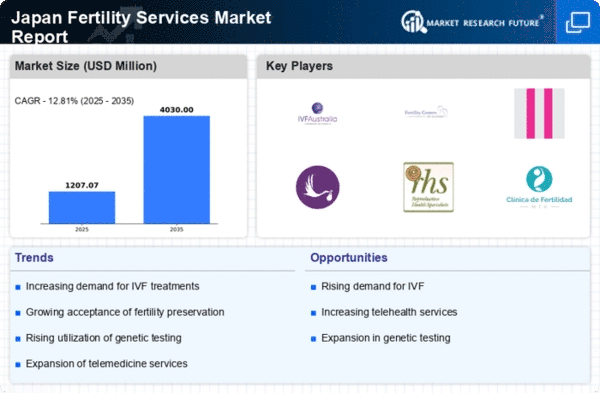The Japan Fertility Services Market is experiencing significant growth, driven by a combination of increasing infertility rates, advancements in reproductive technologies, and a growing acceptance of assisted reproductive techniques. As the demand for fertility services rises, numerous players are entering the market, creating a highly competitive landscape characterized by innovation, partnerships, and expanding service offerings. Companies in this sector are striving to enhance patient experiences, improve treatment outcomes, and broaden their reach to cater to a diverse patient demographic.
The presence of both private and public entities, along with the integration of cutting-edge technology into treatment protocols, is reshaping the dynamics of fertility services, making it essential for market participants to adopt strategic approaches to differentiate themselves.Adena Health has established a notable presence in the Japan Fertility Services Market, leveraging its extensive network and advanced medical technologies to deliver high-quality fertility treatments. The company focuses on providing comprehensive fertility services ranging from artificial insemination to in-vitro fertilization, with a particular emphasis on personalized care.
Adena Health's strengths in this competitive landscape lie in its well-trained medical staff, strong patient support systems, and commitment to research and development, positioning it as a trusted provider within Japan. The company's facilities are equipped with state-of-the-art laboratories and technology, further enhancing its capability to deliver successful treatment outcomes while maintaining a strong reputation in patient satisfaction. Nihon University plays a crucial role in the Japan Fertility Services Market through its commitment to education, research, and clinical practice in reproductive health.
As an academic institution, it offers specialized training programs for healthcare professionals interested in fertility services, thereby ensuring a steady influx of skilled practitioners into the market. Nihon University's strengths lie in its comprehensive research initiatives focused on reproductive health and its longstanding partnerships with various healthcare organizations. The university is engaged in various key projects and initiatives that explore innovative fertility treatments and the underlying biology of infertility. Through its clinical services, Nihon University provides a range of fertility treatments, including assisted reproductive technologies, gynecological consultations, and fertility preservation.
The institution's emphasis on research collaborations and potential partnerships enhances its market presence, allowing it to contribute significantly to advancements in the field while serving as a leading educational and clinical entity in Japan's fertility landscape.






